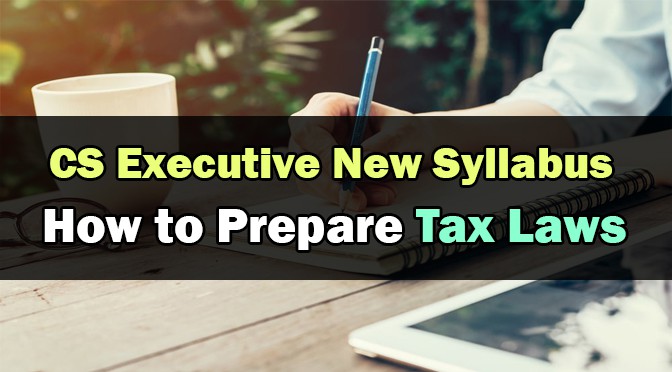BLOG, CS Executive New Syllabus
How to Prepare CS Executive Tax Laws New Syllabus
In this article we will provide you Tips on How to Prepare CS Executive Tax Laws New Syllabus for December 2020 Exam. In previous Article we have told you about Best CS Executive Tax Laws New Syllabus Video Lectures. By going through this post, you will be able to approach this subject in a effective way.
CS Executive Tax Laws New Syllabus
Introduction : This paper consists of two parts, namely Direct Tax and Indirect Tax. The tax that is levied directly on the income or wealth of a person is called direct tax. Indirect taxes were the taxes levied on goods and services on the basis of production, sale or purchase of goods or provision of services in the form of import and export duty, excise, customs, entertainment tax, electricity duty, tax on passenger fares and freight etc. and now Goods & Services Tax levies on supply of goods and/or services.
Best CS Executive New Syllabus Video Lectures Combos
How to Prepare CS Executive Tax Laws New Syllabus : Lesson 1 [Direct Taxes – At a Glance] |
|
In the present time, taxation is not just a means of transferring money to the government to spend it for meeting the public expenditures or raise revenue to the government, but taxes have become beside that, as a tool for redistribution of income and wealth in the society. It also serves as a means of economic development and plays a significant role in stabilization of income. Taxation assist in finding solutions to the economic problems which are faced by a country, like unemployment, inflation, and depression. Countries practice sovereignty authority upon its citizens, through levying of Taxes. The coverage of the lesson would include: · Taxes – Types of taxes and its characteristics, objectives · The Canons of Taxes · Direct v/s Indirect Taxation · The Background of Indian Taxation System and its structure · Tax Administration · The Vital Statistics and Layout of Tax |
How to Prepare CS Executive Tax Laws New Syllabus : Lesson 2 [Basic Concepts of Income Tax] |
|
Taxes are broadly divided into two parts i.e. direct taxes and indirect taxes. The tax that is levied directly on the income or wealth of a person is called direct tax. Income tax is one of the forms of direct taxes. The levy of income tax in India is governed by the Income Tax Act, 1961 and Income Tax Rules, 1962. It is charged on the Total Income and to derive the total income one must know certain concepts of the Income Tax Act, such as residential status, assessment year, previous year, assessee etc. Income tax is leviable on the taxable income and to determine taxable income, ascertainment of the residential status of the person and scope of total income are required at an initial level. There are two types of taxpayers from residential point of view – Resident in India and Non-resident in India. Sourced based income in India is taxable in India whether the person earning income is resident or non-resident. Conversely, foreign sourced income of a person is taxable in India only if such person is resident in India. Therefore, the determination of the residential status of a person is very significant in order to find out his / her tax liability. The coverage of the lesson would include:
|
How to Prepare CS Executive Tax Laws New Syllabus : Lesson 3 [Incomes which do not form Part of Total Income] |
| Tax is calculated on the income earned in the previous year. For providing relief to the tax payers from payment of tax, income tax law contains certain provisions relating to exemption and deduction. Exempted income means the income which is not charged to tax. Under Income Tax Act, section 10 provides for incomes which are exempted from levy of income tax for example Scholarship etc. Further, deduction means the amount which needs to be included in the income first and then they are allowed for deduction in full or in part on fulfillment of certain conditions. For example, deduction for payment of donations under section 80G. This lesson deals with incomes which do not form part of total income. |
How to Prepare CS Executive Tax Laws New Syllabus : Lesson 4 [Computation of Income under Various Heads] |
| The taxability of income of a person depends on the chargeability of such income under the Income tax Act 1961. The total income of an assessee (subject to statutory exemptions) is chargeable under Section 4(1). The scope of the total income, which varies with the residential status, is defined in Section 5. Section 14 enumerates the heads of income under which the income of an assessee will fall. The rules for computing income and the permissible deductions under different heads of income, are dealt in different sections of the Act. The coverage of the lesson includes the heads of income (as mentioned below), along with their corresponding set of sections for the purpose of computation of income. |
How to Prepare CS Executive Tax Laws New Syllabus : Lesson 5 [Clubbing provisions and Set Off and / or Carry Forward of Losses] |
| In addition to the general provisions which are applicable for computation of total income, there are special provisions in Sections 60 to 65 of the Income-tax Act which provide for inclusion of income of other persons in the total income of assessee. The special provisions contained in these sections are designed to counteract the various attempts of an individual for avoiding or reducing his liability to tax by transferring his assets or income to other person(s) while, at the same time, retaining certain powers or interest over the property or it’s income. These provisions may also be termed as clubbing provisions and are covered under first part of the lesson. In the second part of this lesson provisions for set-off and carry forward of losses are discussed. |
How to Prepare CS Executive Tax Laws New Syllabus : Lesson 6 [Deductions from Gross Total Income & Rebate and Relief] |
|
The aggregate of income computed under each head, after giving effect to the provisions for clubbing of income and set off of losses, is known as “Gross Total Income”. Sections 80C to 80U of the Income-tax Act lay down the provisions relating to the deductions allowable to assessees from their gross total income. The coverage of the lesson would include:
|
How to Prepare CS Executive Tax Laws New Syllabus : Lesson 7 [Computation of Total Income and Tax Liability of various entities] |
| The coverage of the lesson would include the Income Tax Treatment with relation to Individual, Hindu Undivided Families (HUF), Firms, Associations of Persons and Cooperative Societies is being discussed. The tax implications, rates of tax and other issues relating to the above persons have been discussed elaboratory. |
How to Prepare CS Executive Tax Laws New Syllabus : Lesson 8 [Classification and Tax Incidence on Companies] |
|
In the previous lessons we have learn the tax provisions of persons not being the company. Here, we will go through the income tax provisions of corporate entity. The coverage of the lesson would include:
– Buyback of Shares Listed on Recognized Stock Exchange – Conversion of an Indian Branch of a foreign company into an Indian subsidiary company – Tax on Income distributed by specified company or Mutual Fund – Taxation aspects related to Conversion of Company into an LLP – Tax liability of company in the event of liquidation – Taxation of Share Premium – Taxation aspects of Amalgamation, Mergers and De-mergers |
How to Prepare CS Executive Tax Laws New Syllabus : Lesson 9 (Procedural Compliance) |
|
The Income-tax Act provides for collection and recovery of income-tax in the following ways, namely:
Once the tax is deducted, it is duty to deposit the same to the credit of the Central Government under prescribed procedures stated under the Income Tax Act, 1961. In this chapter TDS related aspects of the Income Tax Act have been discussed at length with special emphasis on e-TDS and other relevant issues. The coverage of the lesson would include
|
How to Prepare CS Executive Tax Laws New Syllabus : Lesson 10 (Assessment, Appeals and Revision) |
|
The provisions of the Income-Tax Act contained in Sections 117 to 136 specify the procedure relating to the appointment of the various income-tax authorities, their powers, functions, jurisdiction and control. The procedure under the Income-tax Act for making an assessment of income begins with the filing of a return of income. Section 139 of the Act contains the relevant provisions relating to the furnishing of a return of income. On the basis of return of income the income tax authority makes the assessment. The coverage of the lesson would include
The Income-tax Act provides for various remedies to an assessee on completion of the assessment. The main remedies available to an assessee on completion of the assessment are Appeals, Revision, and Rectification. All these remedies work in different areas. However, strictly speaking the remedies are not alternative to each other but at times more than one remedial proceeding may be used as complimentary to each other so as to achieve the best results. The right to appeal arises where the taxpayer is aggrieved by the order passed by the income-tax authority. The coverage of the lesson would also include :
|
How to Prepare CS Executive Tax Laws New Syllabus : Lesson 11: Concept of Indirect Taxes at a glance |
| Chapter 11 contains the Constitutional powers of taxation and an overview of Indirect taxes in India along with Pre-GST tax structure and its shortcomings. It also lays an overview of Administration of Indirect Taxation in India and the Existing tax structure. Erstwhile indirect taxes consisted of various laws at Central and State level including VAT, Excise, Service Tax etc. which had some challenges that were required to be addressed like multiplicity of taxes and their cascading effects. Goods & Services Tax brought a single tax regime which got levied on supply of goods or services or both thereby overcoming the gaps of previous indirect tax laws. Various Constitutional amendments have been made to enable centre and states to levy GST simultaneously and New Articles got inserted. |
How to Prepare CS Executive Tax Laws New Syllabus : Lesson 12: Basics of Goods and Services Tax |
|
The chapter covers Basics of GST and GST Models including CGST / IGST / SGST / UTGST, Supply which is the taxable event under GST. It is to be noted that supply can be of two types i.e., composite and mixed supply. In a composite supply, the goods are naturally bundled. The Chapter contains the levy and collection of CGST and IGST under the GST Law and broad rates prescribed therein. Composition scheme is a scheme wherein GST is not collected from the recipients / customers subject to a prescribed threshold turnover. In a composition levy, the supplier cannot himself take Input Tax Credit. Under Reverse Charge, the recipient pays the GST on the supply on behalf of the supplier. Exemptions under GST may be General or by a Special Order. |
How to Prepare CS Executive Tax Laws New Syllabus : Lesson 13: Concept of Time, Value & Place of Taxable Supply |
|
The chapter comprises of Basic concepts of Time and Value of Taxable Supply. Taxable event is the point which gives rise to taxability and the point of levy is determined by Time of supply and thus value of supply determines value on which GST is payable. Valuation includes determining the value on which GST is payable by following the Valuation Rules and principles, contained in the GST law Basic concepts of Place of Taxable Supply include intra state and interstate supply as well as determining the place of supply under various situations. When the location of supplier and the place of supply are within the same state, it is an Intra-State Supply, and if these are in different states, then it is Inter-State supply |
How to Prepare CS Executive Tax Laws New Syllabus : Lesson 14: Input Tax Credit & Computation of GST Liability – Overview |
|
Integrated GST, Central GST, State GST or Union Territory GST paid on inward supply of inputs, capital goods and services are called input taxes and its credit is Input Tax Credit (ITC). Company which distributes the input tax credit to various units on the basis of their previous year turnover is called input service distributor. There is no offset of ITC available between the CGST and the SGST. GST is a consumption based tax levied on the basis of the “Destination principle.” It is an inclusive tax regime covering both goods and services, to be collected on value-added at each stage of the supply chain. |
How to Prepare CS Executive Tax Laws New Syllabus : Lesson 15: Procedural Compliance under GST |
|
Procedural Compliances include the terms for eligibility of compulsory and voluntary Registration and the persons exempt from Registration and procedure thereby. The Chapter explains the concept of Tax Invoices, Debit & Credit Note including cases where Delivery Challan or Bill of Supply is needed instead. The Act prescribes the Accounts and Records that an assessee should maintain. Electronic way Bills have been introduced under the GST Law for movement of goods. Under GST, various monthly, quarterly and annual returns are filed. Payment can be made via NEFT, RTGS, net banking, debit /credit card. The law prescribes two types of Audit under GST – General and Special. Refund Procedures are contained in the given Chapter |
How to Prepare CS Executive Tax Laws New Syllabus :Lesson 16: Basic overview on Integrated Goods and Service Tax (IGST), Union Territory Goods and Service tax (UTGST), and GST Compensation to States |
|
The President of India gave assent to the following four Acts, related to GST
Apart from these, every State has its own State GST Act. Delhi and Puducherry are two Union Territories but UTGST Act, governing GST for Union Territories shall not be applicable there as they have their own State Legislature and Government. State GST would be applicable in their case. IGST Act, 2017 governs Integrated Goods & Services Tax, which is levied and collected by the Centre on inter-state supply of goods and services including imports into India and supplies made outside India along with supplies to / from SEZs. The GST (Compensation to States) Act, 2017 ascertains the amount of compensation that shall be payable by the Government to states during the transition period of five years due to the revenue loss owing to levy of Goods and Services Tax. The Act provides for calculation and ascertainment of base year, projected growth rate, compensation to be paid etc. |
How to Prepare CS Executive Tax Laws New Syllabus : Lesson 17: Overview of Customs Act |
|
With the implementation of GST Law, the Basic Customs Duty is still levied on imports with other additional duties being subsumed under GST. The basic and overview of Customs Act is contained in Chapter 17 which consists of provisions for levy and collection of customs duties and its types, Classification and valuation of import and export goods alongwith exemptions, administration of Customs Law including Officers under the Law. Valuation Rules are explained. The Chapter also consists of Import and Export Procedures, provisions for Transportation and Warehousing and Duty Drawback. The Chapter states the conditions for Confiscation of Goods and Conveyances and procedures for Refund and Demand as well as Recovery. |
Check out our articles for other Subjects
1. How to Prepare CS Executive New Syllabus Jurisprudence, Interpretation and General Laws
2. How to Prepare CS Executive New Syllabus Company Law
3. How to Prepare CS Executive New Syllabus Setting up of Business Entities and Closure
4. How to Prepare CS Executive New Syllabus Tax Laws
5. How to Prepare CS Executive New Syllabus Corporate and Management Accounting
6. How to Prepare CS Executive New Syllabus Securities Laws and Capital Markets
7. How to Prepare CS Executive New Syllabus Economic Business and Commercial Laws
8. How to Prepare CS Executive New Syllabus Financial and Strategic Management
For CS Executive New Syllabus Video Lectures, Click on Below mentioned Subjects









